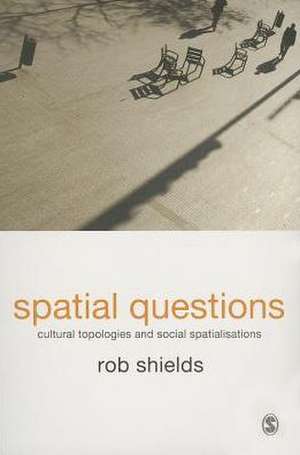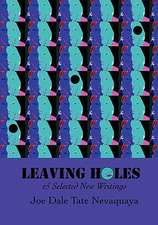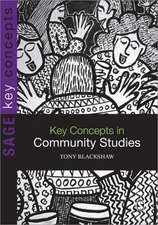Spatial Questions: Cultural Topologies and Social Spatialisation
Autor Rob Shieldsen Limba Engleză Paperback – 21 aug 2013
- John Urry, Distinguished Professor, Department of Sociology, Lancaster University
Our understanding of space is crucial to the way in which we understand major social problems and issues and the way we develop and maintain our worldviews.
Building from a history of philosophical and geographical theories of space, Shields presents the importance of spatialisation and cultural topology in social theory and the possibilities that lie within these theoretical tools.
Innovative and thought-provoking, this book goes beyond traditional ideas of spatiality and temporality to understand the multiplicity of spatialisations and relates them to everyday life.
| Toate formatele și edițiile | Preț | Express |
|---|---|---|
| Paperback (1) | 464.60 lei 43-57 zile | |
| SAGE Publications – 21 aug 2013 | 464.60 lei 43-57 zile | |
| Hardback (1) | 1114.65 lei 43-57 zile | |
| SAGE Publications – 21 aug 2013 | 1114.65 lei 43-57 zile |
Preț: 464.60 lei
Nou
Puncte Express: 697
Preț estimativ în valută:
88.90€ • 93.05$ • 73.99£
88.90€ • 93.05$ • 73.99£
Carte tipărită la comandă
Livrare economică 31 martie-14 aprilie
Preluare comenzi: 021 569.72.76
Specificații
ISBN-13: 9781848606654
ISBN-10: 1848606656
Pagini: 216
Ilustrații: maps, figures
Dimensiuni: 156 x 234 x 11 mm
Greutate: 0.34 kg
Ediția:1
Editura: SAGE Publications
Colecția Sage Publications Ltd
Locul publicării:London, United Kingdom
ISBN-10: 1848606656
Pagini: 216
Ilustrații: maps, figures
Dimensiuni: 156 x 234 x 11 mm
Greutate: 0.34 kg
Ediția:1
Editura: SAGE Publications
Colecția Sage Publications Ltd
Locul publicării:London, United Kingdom
Recenzii
'Rob Shields provides here an immensely sophisticated and detailed examination of the topological turn. He has been examining these issues for some decades and this book will surely become the standard work on cultural and spatial topology'
Spatial Questions provides one of the most complete accounts in the recent literature engaging with topology. The reader might be deceived by the apparently slim format, which nevertheless packs material that could easily inform several volumes on the topic. Spatial Questions is a welcome contribution to spatial theory and, given the prominence of the topic nowadays, as well as the hype built around the topological over the past years, the book might equally appeal to geographers and to a broader audience within the social sciences.
Spatial Questions: Cultural Topologies and Social Spatialisation provides an important contribution to the study of topology at large and to those who engage with human geography in particular, coinciding with recent topological discussions in such journals as Progress in Human Geography (2014), Theory, Culture & Society (2012) and Dialogues in Human Geography (2011). As in his previous writings, Shields’ provides a vivid and clear discussion, accessible to a wide range of readers from various disciplines. These undoubtedly will find the call for a ‘topological turn’ valuable and thought provoking.
A welcome contribution to spatial theory... allowing for a new and fresh understanding of “spacing” and the spatialisations that are accomplished through everyday activities, representations and conflicts.
Spatial Questions provides one of the most complete accounts in the recent literature engaging with topology. The reader might be deceived by the apparently slim format, which nevertheless packs material that could easily inform several volumes on the topic. Spatial Questions is a welcome contribution to spatial theory and, given the prominence of the topic nowadays, as well as the hype built around the topological over the past years, the book might equally appeal to geographers and to a broader audience within the social sciences.
Spatial Questions: Cultural Topologies and Social Spatialisation provides an important contribution to the study of topology at large and to those who engage with human geography in particular, coinciding with recent topological discussions in such journals as Progress in Human Geography (2014), Theory, Culture & Society (2012) and Dialogues in Human Geography (2011). As in his previous writings, Shields’ provides a vivid and clear discussion, accessible to a wide range of readers from various disciplines. These undoubtedly will find the call for a ‘topological turn’ valuable and thought provoking.
A welcome contribution to spatial theory... allowing for a new and fresh understanding of “spacing” and the spatialisations that are accomplished through everyday activities, representations and conflicts.
Cuprins
Overtures
From the Shan Hai Jing to Herodotus' Historiae and to Idrisi's Kitab Nuzhat
Mediterranean Geographies
Spatialisation and Space-Time
The Argument of this Book
Spatialisations
Space as Problem: Etymology/Translation
'L'espace Lefebvre'
Respecting Lefebvre: Critical Tensions
The Spatialisations of Places and Regions
Memorial and Anticipatory Spatialisation: Time-Spaces
Vieux Quebec: The Example of Tourist Practices
Histories of Space
Mediterranean Geometric Space
Northern Europe: Mathematical Space
Dimensionality: Three, Four or More?
Flatness
Relativistic Space
The Socialness of Space
Recognising Spatialisation
Marx: The Economics of Land
Engels: Inequality and the Built Environment
Simmel: Spatial Projections of Social Forms
Cultural Understanding of Space: Emile Durkheim
Physical Planning, Land Use Planning, Spatialisation and Spatial Semantics
Spatial Struggles
Discourses on Space
Topologies
'Another Kind of Analysis' - Beyond Geometry
Connectivity and Schematics
Geometry and Topology
The Seven Bridges of Königsburg
Non-Euclidean Space
The Topological Sensorium
Dimensionality and Orientability
Topological Archetypes: Folds, Bridges, Labyrinths
The 'Plushness' of the Real
Cultural Topology
Diagrams
Deleuze Folding Foucault
Heterotopias of Scale
Scale and Topology
Topology and the Social - Networks, Surfaces and Milieux
Relations and Boundary Objects
Cultural Topology
A Topology of Experience
The Cusp
Glossary of Terms
From the Shan Hai Jing to Herodotus' Historiae and to Idrisi's Kitab Nuzhat
Mediterranean Geographies
Spatialisation and Space-Time
The Argument of this Book
Spatialisations
Space as Problem: Etymology/Translation
'L'espace Lefebvre'
Respecting Lefebvre: Critical Tensions
The Spatialisations of Places and Regions
Memorial and Anticipatory Spatialisation: Time-Spaces
Vieux Quebec: The Example of Tourist Practices
Histories of Space
Mediterranean Geometric Space
Northern Europe: Mathematical Space
Dimensionality: Three, Four or More?
Flatness
Relativistic Space
The Socialness of Space
Recognising Spatialisation
Marx: The Economics of Land
Engels: Inequality and the Built Environment
Simmel: Spatial Projections of Social Forms
Cultural Understanding of Space: Emile Durkheim
Physical Planning, Land Use Planning, Spatialisation and Spatial Semantics
Spatial Struggles
Discourses on Space
Topologies
'Another Kind of Analysis' - Beyond Geometry
Connectivity and Schematics
Geometry and Topology
The Seven Bridges of Königsburg
Non-Euclidean Space
The Topological Sensorium
Dimensionality and Orientability
Topological Archetypes: Folds, Bridges, Labyrinths
The 'Plushness' of the Real
Cultural Topology
Diagrams
Deleuze Folding Foucault
Heterotopias of Scale
Scale and Topology
Topology and the Social - Networks, Surfaces and Milieux
Relations and Boundary Objects
Cultural Topology
A Topology of Experience
The Cusp
Glossary of Terms
Notă biografică
Descriere
A thought-provoking exploration not about space per se, but rather about how we perceive space, and why it is important to look at space if we want to understand human interaction.
















